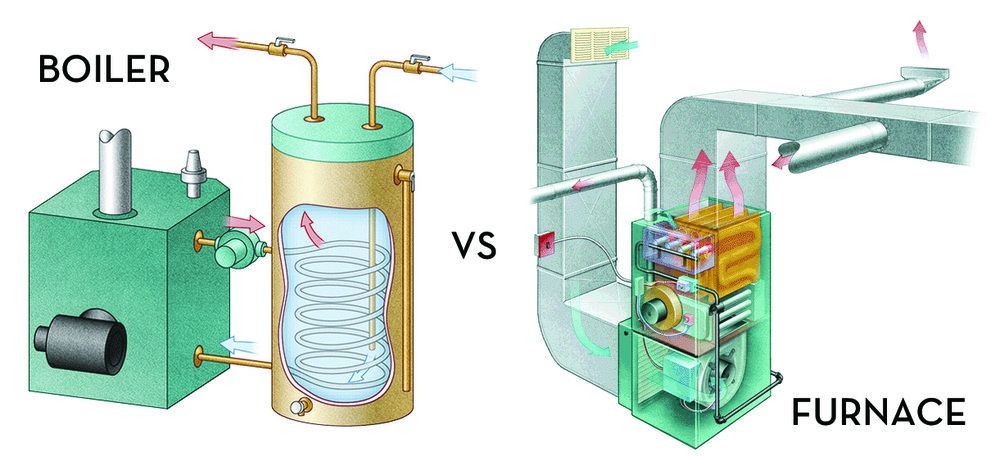what is the difference between a furnace and a boiler?

air vs. water
Many homeowners refer to their heating systems as “furnaces” and “boilers” interchangeably, however, both types of units have some major differences. The easiest way to differentiate between the two systems is that furnaces heat air, which is distributed via ductwork, while boilers heat water, which is distributed via radiators, baseboard, or radiant floor heat.
how a furnace functions
Within a furnace, the fuel (heating oil, natural gas, or propane) is ignited by the burner in the combustion chamber. During this process, flames heat up a metal heat exchanger, which transfers the heat to the contained air. The bi-product of this process is exhaust (containing carbon monoxide), which is forced out of the flue to the vent connector, which safely removes it from the house. The hot air at the heat exchanger is then forced into the ductwork by the blower. The hot air travels throughout the home via the ductwork, filling each room. As the air cools, it is drawn back into return ducts which brings it back to the furnace to be heated once again. This cycle continues until the air within the home is heated to the temperature that is called for on the thermostat.
furnace ductwork
One benefit of having a furnace is that ductwork is already installed and in use in a home, which makes the integration of a central air system a much quicker and easier option in the future. Because both furnaces and air conditioners can use the same ducts and vents to distribute air throughout a home, the interior of the home would not experience much change or disruption when installing a central air conditioning system.
how a boiler functions
A boiler operates in much the same way, using heating oil, natural gas or propane within a combustion chamber to heat water or steam. The hot water or steam is then distributed via piping or tubing to radiators or radiant floor systems that then heat the home. As the water cools or steam condenses, it travels back through the system to the boiler where it is again reheated by the burner. This cycle continues until the temperature within the home reaches the setting on the thermostat.
domestic hot water
An added benefit to a boiler is the option of using the same process that heats the water flowing through radiators to also heat the home’s domestic hot water. Instead of having a separate hot water system (powered by heating oil, natural gas, propane or electricity), boilers can heat that water for use in sinks and showers while it is already providing heat for the home. This option can provide a more efficient use of energy during colder months.
factors to consider before an installation
Radiant heat (from a boiler) is often considered more efficient than forced hot air heat (from a furnace). However, there are several other factors to consider – many of which can depend on preference – if deciding between the two different systems. For a free estimate from Weaver Energy on the installation of a furnace or boiler in a new or existing home in Lancaster County, please visit www.weaverenergy.com or call the Weaver Energy office at (717) 626-7169.